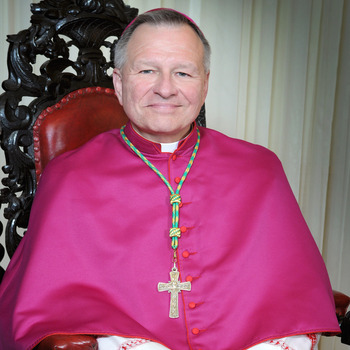
A platform that encourages healthy conversation, spiritual support, growth and fellowship

NOLACatholic Parenting Podcast
A natural progression of our weekly column in the Clarion Herald and blog

The best in Catholic news and inspiration - wherever you are!
Archdiocese completes review for 2023 world synod
-

By Archbishop Gregory M. Aymond
Clarion Herald
The diocesan phase of Pope Francis’ global synod came to a close over the summer. Can you recap for us what was done in the archdiocese?Pope Francis called for a global Synod on Synodality beginning in October of last year and concluding in 2023. The diocesan phase called for local bishops to enact different ways of listening to the people of God in their dioceses, with a particular focus on invitation and outreach to those on the margins. Locally, the synod coordinator held a series of listening sessions, many of which I was a part of. There was also online access available for people to make their voices heard. All of this information was synthesized into a report that was finalized and submitted to the U.S. Conference of Catholic Bishops (USCCB) in July.
Who are some of the “disenfranchised groups” that took part in the synod process?
There was a very specific invitation to young Catholics to bring a friend who is not an active Catholic to one of the listening sessions. This was a very humbling experience as people who accepted the invitation came with a lot of emotion and anger toward the church. It was good for their voices to be heard, and I hope that for all participants this was a chance to experience a pastoral and caring church who is truly listening and wants to hear them. There were also conversations and sessions with groups from diverse racial backgrounds, ecumenical leaders, the LGBTQ+ community and various age groups.
What were some of the key themes that arose in the conversations?
There were six key themes that arose over and over again in our conversations. Namely:
™歬 Inclusivity: A need for personal invitation to participate and offering a “seat at the table” for those with whom we disagree;
™ Preaching: Making homilies practical to everyday life and offering opportunities for more lay involvement in ministry;
™ Sensitivity to the marginalized: Fostering genuine concern and reconciliation for those who have been hurt by the church and challenging church leaders to dedicate more time to outreach;
™歬 Reconciliation and accountability: The church must continue to acknowledge its failings and be more transparent at all levels of governance;
™ Support for varied approaches to ecclesiology and spirituality: Celebrate unity in diversity and avoid political divisiveness;
™ Pandemic-related issues: Need to invite people back to the sacraments while avoiding division caused by the pandemic and acknowledging the eucharistic renewal following the shutdowns is appreciated.
What happens next with the synod?
Unlike our archdiocesan synod in 2016, there are no concrete action steps or plans for our local church coming next. Rather, this information was collected and reported to the USCCB, which will make a national report to the Vatican. From there, we will hear from the Holy Father more about what we’ve learned and what we are called to do as a global church to respond to the synod. That said, we learned a great deal from our synod work here, and I have discussed how we can begin to address some of these six key themes with those in ministry. Let us continue to pray for the guidance of the Holy Spirit for our local church and for our Holy Father and the universal church.
Questions for Archbishop Aymond may be sent to [email protected].




